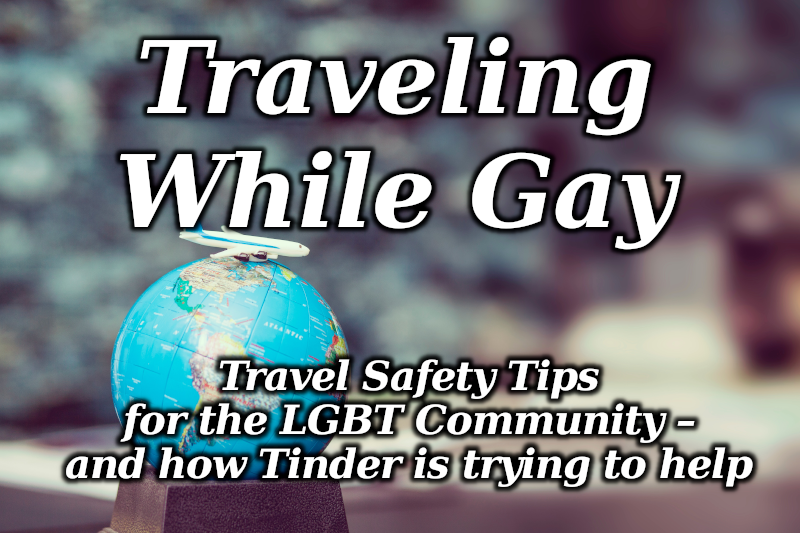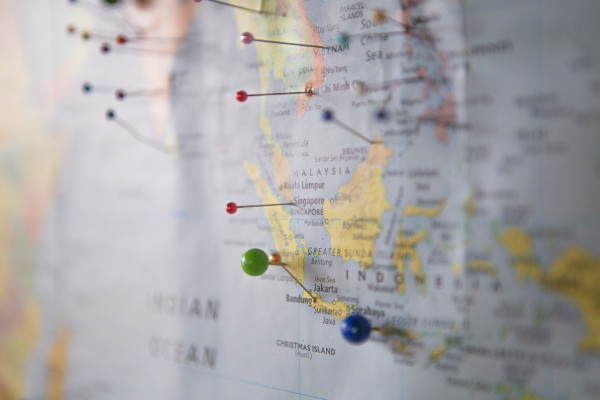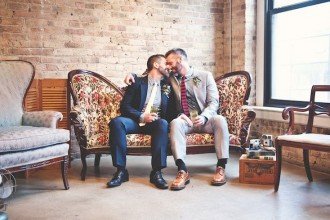Travel Safety Tips for the LGBT Community –
and how Tinder is trying to help

Taking off for a change in scenery, traveling for a concert or other festival and simply taking the plunge to see all the places on your personal Bucket List is the dream of many. There are plenty of logistic and practical issues to deal with when planning to travel. For members of the LGBTQ+ community, there’s an additional layer of safety to consider.
Safety while traveling is important for everyone – pickpockets, scam artists, and terrorism affect people across the board. But for people who are gay, queer, non-binary or otherwise ‘outside the norm’ safety concerns can run much more deeply. From meeting strangers in a strange land to understanding laws or local customs that may be problematic for same sex couples, single members of the LGBTQ+ community or simply anyone who doesn’t conform to gender norms.
Travel Safety Concerns for LGBTQ+ People
Both domestic and international travel requires a bit of extra planning for LGBTQ+ people. Concerns over safety aren’t an overreaction, either. While LGBTQ+ rights have advanced by leaps and bounds, there are plenty of stories from within the past few years that highlight the need for increased safety.
- In early 2018, Egypt initiated a ‘crack down’ on LGBT activity, making headlines with the arrest of more than 10 people over the course of just a few days. (HRW)
- During the summer of 2019, a lesbian couple on a bus in London was attacked after they refused to kiss for a group on onlookers. (BBC)
- In November of 2019, Tang Van Duc and Lee Vu Linh were arrested in Malaysia for “immoral acts” when it was revealed the couple was… well, a couple. The men ultimately pled guilty and were fined RM1000 (around $240). (LGBTQ Nation)
In addition to stories that manage to make headlines, there are plenty of stories from members of the LGBTQ+ community about casual and overt harassment concerning everything from bathroom use to holding hands in public while traveling in different cities, states and countries.
There are loads of specific safety tips when it comes to travel, but we’ve narrowed it down to three fundamentals every LGBTQ+ identifying person should consider when planning to travel domestic or internationally.

Research!
This includes everything – the town, the state, the country and even the hotel you plan on visiting while traveling. Check local laws, particular in countries with a known history of persecution based on gender or sexual orientation.
Beyond laws, however, look into the local culture as much as you are able. If there is a local chapter of Stonewall or other LGBT positive organization, get in touch to find out more about the area as well as tips on hotels or attractions.
Your research can also find local LGBTQ+ friendly local businesses to visit. Check out stores, coffee shops, restaurants and other businesses with LGBTQ+ management or a history of supporting the community.
Know Your Rights – And What to Do If They Are Violated
Understand what your rights are when traveling, especially if you are headed to an international destination. Even locally, however, it’s important to have a firm understanding of those rights. For example, within the United States TSA officers can’t legally ask transgender people to remove binders or prosthetic devices. On the other hand, it’s also illegal for someone to be refused service based on their sexual orientation or gender but there are plenty of stories about LGBT people being refused services.
Knowing what your rights are and standing up for them are two separate issues however. Even if you know you are in the right, consider each situation carefully. Have the name and number of a lawyer, your family and any local organizations you found as a part of your research handy. For couples traveling together – especially those with children – taking along a copy of your marriage certificate, custody and adoption papers, and any other documents that confirm your familial connection is a good idea as well.
Be Careful When Hooking Up or Meeting Friends
Meeting new people is a huge part of travel for many people. Whether you want to make a new friend or take it to a more intimate level, it’s important to remember the people you meet are strangers and you don’t have the advantage of being in familiar surroundings.
Some travelers roll their eyes when it comes to The Safety Talk. But no matter how often you’ve hooked up via apps like Tinder, it’s important to err on the side of caution when traveling. Depending on where you are, the consequences could be severe.
When it comes to safety, go back to the basics:
- Meet in a public place.
- Opt for areas that are well-lit and well populated.
- Do not accept drinks that are brought to you.
- Keep your bag / purse / jacket / belongings on you as much as possible.
- Always let someone know where you’re going (The hotel concierge is a great options for those traveling alone.)
- Be aware of your surroundings.

Make the Most Out of Technology
In addition to these fundamentals of safety, use whatever technology you have at your disposal.
Tinder has recently rolled out a new safety feature called a ‘traveler alert’. When engaged, the ‘traveler alert’ will advise users when they are in a country that criminalizes consensual same-sex relationships or acts. In addition to alerting the user, Tinder will automatically hide the user’s profile from the public.
A bright pink screen pops up and a full screen, in-app alert reads:
“Based on your geographical location, it appears you’re in a place where the LGBTQ community may be penalized. We want you to have fun but your safety is our #1 priority. Please proceed with caution and take extra care when making new matches and meeting people you do not know.”
Beneath the alert, the user is prompted to either continue to leave their profile hidden or to make their profile public.
Tinder worked together with the International Lesbian, Gay, Bisexual, Trans and Intersex Association (also known as ILGA World) to compile a list of over 70 countries that have laws targeting LGBTQ people. In some of these countries, there have even been cases of authorities using popular apps like Tinder to entrap travelers or even penalizing communication on Tinder and similar apps.
The ILGA World organization works each year to publish a report of state sponsored homophobia, as well as maps of countries with sexual orientation laws. Punishments under these laws can vary from time in jail to the death sentence. According to ILGA, the death sentence is possible in Mauritania, Nigeria, Somalia, Sudan, Afghanistan, Iran, Pakistan, Qatar, Saudi Arabia, the United Arab Emirates and Yemen. The ILGA’s latest State Sponsored Homophobia report was published in December 2019. This eye-opening read can be found on their website.
Tinder has been increasingly open and accommodating to the LGBTQ community. This safety update news follows an app update in the summer of 2019 that vastly expanded the number of sexual orientation options available for one’s profile. Options now include straight, gay, lesbian, bisexual, asexual, demisexual, pansexual, queer and questioning. This feature is currently only available in English-speaking markets but will hopefully expand to more market in the future.
Tinder executives recognized that with the wider array of sexual orientation choices, it also enabled users to be endangered or targeted due to their sexual orientation. This latest safety update by Tinder is aimed at protecting these populations. Additionally, Tinder made steps to update their safety tips with a section dedicated solely to the LGBTQ community.
While these safety tips do touch on serious issues, don’t take this as a warning against traveling. Not only does travel enrich your soul, it allows you to connect with people you simply would never meet otherwise. You might be the first person someone meets in whom they see a part of themselves. While it is heartbreaking that these kind of precautions are even necessary, improvement such as Tinder’s alert should be applauded for these proactive steps to protect and ensure the safety of their users. Stay safe, see the world and swipe on, friends!




